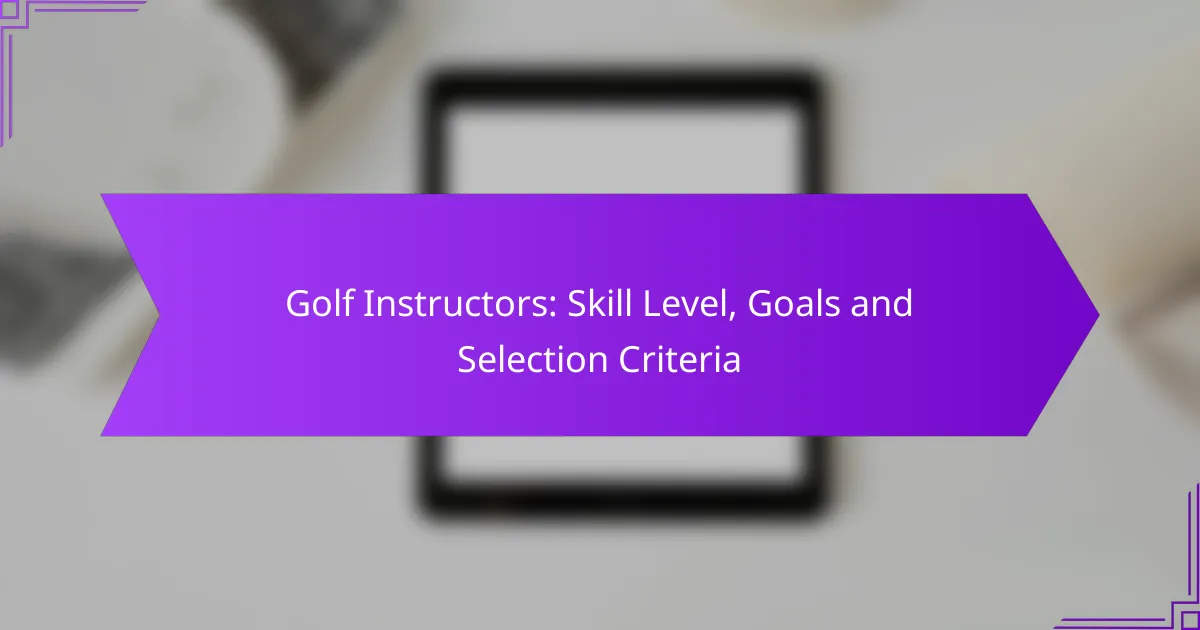Selecting the right golf instructor is crucial for golfers at any skill level, from novices to seasoned players. By considering factors such as qualifications, teaching style, and student feedback, you can find an instructor who aligns with your personal goals and learning preferences. Tailored instruction not only enhances your performance but also enriches your overall golfing experience.

How to choose the right golf instructor in Los Angeles?
Choosing the right golf instructor in Los Angeles involves assessing their qualifications, teaching style, student feedback, lesson availability, and pricing. A well-rounded approach ensures you find an instructor who meets your specific needs and helps you achieve your golfing goals.
Consider instructor qualifications
When selecting a golf instructor, check their qualifications and certifications. Look for instructors who are certified by recognized organizations, such as the PGA or LPGA, as this indicates a standard level of expertise and knowledge.
Additionally, consider their experience level. Instructors with years of teaching experience often have refined methods and a better understanding of common student challenges.
Evaluate teaching style
Teaching style is crucial in determining how well you will learn. Some instructors may focus on technical skills, while others emphasize mental strategies or course management. Identify what resonates with you and aligns with your learning preferences.
It can be helpful to observe a lesson or take a trial session to gauge their approach. Look for instructors who communicate clearly and provide constructive feedback.
Assess student reviews
Student reviews can provide valuable insights into an instructor’s effectiveness. Check online platforms or local golf forums for testimonials from former students. Positive feedback often highlights an instructor’s ability to improve skills and foster a supportive learning environment.
Be cautious of instructors with consistently negative reviews, as this may indicate issues with their teaching methods or student interactions.
Check lesson availability
Ensure that the instructor’s schedule aligns with your availability. Many instructors in Los Angeles offer flexible lesson times, including evenings and weekends, which can be beneficial for busy individuals.
Inquire about the frequency and duration of lessons. Regular sessions can lead to better progress, so consider instructors who can accommodate your desired lesson frequency.
Compare pricing structures
Pricing for golf lessons in Los Angeles can vary widely based on the instructor’s experience and location. Typically, rates range from $50 to $150 per hour. Some instructors may offer package deals or discounts for multiple lessons, which can be more economical.
Evaluate what is included in the price, such as range fees or equipment usage. Understanding the full cost will help you make an informed decision without unexpected expenses.

What skill levels do golf instructors cater to?
Golf instructors cater to a wide range of skill levels, from beginners just starting out to advanced players looking to refine their techniques. Each level requires tailored instruction to address specific needs and goals, ensuring effective learning and improvement.
Beginner golf instruction
Beginner golf instruction focuses on the fundamentals of the game, including grip, stance, and basic swing mechanics. Instructors often use simplified drills and exercises to build confidence and familiarity with the equipment.
Common pitfalls for beginners include developing bad habits early on, so instructors emphasize proper techniques from the start. A typical lesson may involve practicing short shots and putting to establish a solid foundation.
Intermediate golf coaching
Intermediate golf coaching aims to enhance skills developed during the beginner phase, focusing on consistency and course management. Instructors introduce more complex techniques, such as shaping shots and understanding course strategy.
Students at this level should expect to work on their short game and mental approach to golf. Regular practice sessions and on-course play are essential for improvement, and instructors often provide feedback on performance during actual rounds.
Advanced player training
Advanced player training is tailored for those who have a strong grasp of the game and seek to fine-tune their skills for competitive play. Instructors analyze swing mechanics in detail and may use technology, such as video analysis, to provide precise feedback.
At this level, players often focus on specific aspects like shot selection, mental toughness, and physical conditioning. Advanced training might include course simulations and competitive scenarios to prepare for tournaments, ensuring players are ready for high-pressure situations.

What are the common goals of golf instruction?
The common goals of golf instruction focus on improving a player’s overall performance, including their swing, short game, and mental approach. Instructors aim to help golfers develop skills that lead to better scores and a more enjoyable experience on the course.
Improving swing mechanics
Improving swing mechanics is essential for achieving consistent ball striking and distance. Golf instructors often analyze a player’s swing using video technology and provide feedback on grip, stance, and follow-through. Key areas to focus on include maintaining proper posture and ensuring a smooth, rhythmic motion throughout the swing.
Common drills to enhance swing mechanics include practicing with alignment sticks and using weighted clubs to build strength and muscle memory. Regular practice can lead to significant improvements in accuracy and power.
Enhancing short game skills
Enhancing short game skills is crucial for lowering scores, as a significant percentage of strokes are taken around the greens. Instructors emphasize techniques for chipping, pitching, and putting to help players become more proficient in these areas. Key aspects include learning to read greens and mastering various shot types.
Practicing with different lies and conditions can improve a golfer’s adaptability. A common exercise is to set up targets at varying distances and practice hitting to those spots, which helps develop precision and touch.
Developing mental game strategies
Developing mental game strategies is vital for maintaining focus and composure during play. Golf instructors often teach techniques such as visualization, breathing exercises, and pre-shot routines to help players manage pressure. A strong mental game can lead to improved performance, especially in competitive situations.
Players should practice mindfulness and self-talk to build confidence and reduce anxiety on the course. Keeping a positive mindset and setting realistic goals can also enhance overall enjoyment and performance in the game.

What selection criteria should be considered for golf instructors?
When selecting a golf instructor, consider their experience, specialization, and location. These factors can significantly impact the effectiveness of your learning and overall experience.
Instructor experience and credentials
Experience and credentials are crucial when choosing a golf instructor. Look for instructors with certifications from recognized organizations, such as the PGA or LPGA, as these credentials often indicate a solid understanding of teaching methods and golf mechanics.
Additionally, consider the instructor’s years of experience. Instructors with several years of teaching can provide insights and techniques that newer instructors may not yet have mastered. A good benchmark is to seek instructors with at least five years of teaching experience.
Specialization in specific skills
Instructors may specialize in various aspects of golf, such as driving, putting, or short game techniques. Identifying your specific goals, whether improving your swing or mastering putting, can help you select an instructor who excels in those areas.
Some instructors may also focus on teaching beginners, while others might cater to advanced players. Ensure that the instructor’s expertise aligns with your skill level and desired improvements for the best results.
Location and accessibility
Location plays a significant role in selecting a golf instructor. Choose an instructor whose facility is conveniently located, as this will facilitate regular practice and lessons. Consider instructors based at local golf courses or driving ranges that you can easily access.
Additionally, check the availability of the instructor. Some may offer flexible scheduling, while others might have limited hours. Ensuring that their schedule aligns with yours can help maintain consistency in your training.

What are the benefits of private vs group lessons?
Private lessons offer tailored instruction, while group lessons provide a more budget-friendly option. Choosing between them depends on your learning style, goals, and budget.
Personalized attention in private lessons
Private lessons focus solely on your individual needs, allowing the instructor to tailor drills and feedback specifically for you. This personalized attention can accelerate your learning, as you receive immediate corrections and guidance on your technique.
For golfers looking to improve specific skills or overcome particular challenges, private lessons can be especially beneficial. You can schedule sessions at your convenience and progress at your own pace, making it easier to integrate lessons into your routine.
Cost-effectiveness of group lessons
Group lessons typically cost less per person than private sessions, making them a more economical choice for many golfers. They allow you to share the instructor’s time with others, which can significantly reduce the price of each lesson.
While group lessons may not provide the same level of individualized feedback, they foster a supportive environment where you can learn from peers. This can be motivating and enjoyable, especially for beginners who appreciate the camaraderie of learning alongside others.



